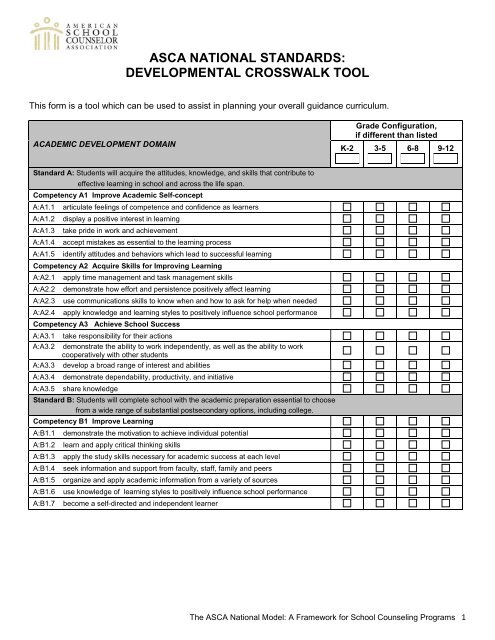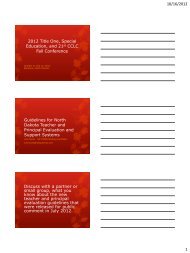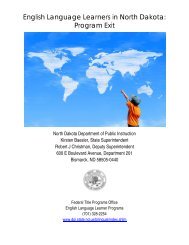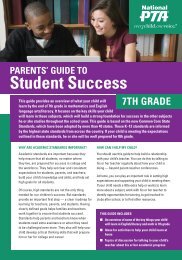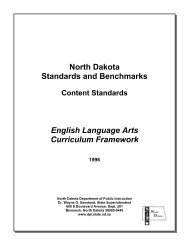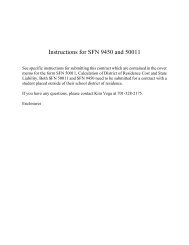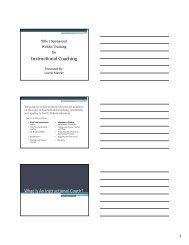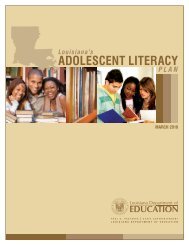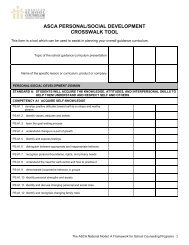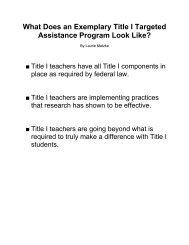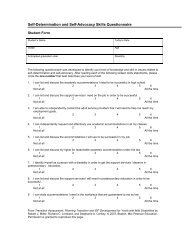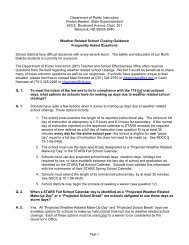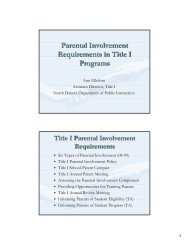ASCA NATIONAL STANDARDS: DEVELOPMENTAL CROSSWALK ...
ASCA NATIONAL STANDARDS: DEVELOPMENTAL CROSSWALK ...
ASCA NATIONAL STANDARDS: DEVELOPMENTAL CROSSWALK ...
You also want an ePaper? Increase the reach of your titles
YUMPU automatically turns print PDFs into web optimized ePapers that Google loves.
<strong>ASCA</strong> <strong>NATIONAL</strong> <strong>STANDARDS</strong>:<strong>DEVELOPMENTAL</strong> <strong>CROSSWALK</strong> TOOLThis form is a tool which can be used to assist in planning your overall guidance curriculum.ACADEMIC DEVELOPMENT DOMAINGrade Configuration,if different than listedK-2 3-5 6-8 9-12Standard A: Students will acquire the attitudes, knowledge, and skills that contribute toeffective learning in school and across the life span.Competency A1 Improve Academic Self-conceptA:A1.1 articulate feelings of competence and confidence as learnersA:A1.2 display a positive interest in learningA:A1.3 take pride in work and achievementA:A1.4 accept mistakes as essential to the learning processA:A1.5 identify attitudes and behaviors which lead to successful learningCompetency A2 Acquire Skills for Improving LearningA:A2.1 apply time management and task management skillsA:A2.2 demonstrate how effort and persistence positively affect learningA:A2.3 use communications skills to know when and how to ask for help when neededA:A2.4 apply knowledge and learning styles to positively influence school performanceCompetency A3 Achieve School SuccessA:A3.1 take responsibility for their actionsA:A3.2 demonstrate the ability to work independently, as well as the ability to workcooperatively with other studentsA:A3.3 develop a broad range of interest and abilitiesA:A3.4 demonstrate dependability, productivity, and initiativeA:A3.5 share knowledgeStandard B: Students will complete school with the academic preparation essential to choosefrom a wide range of substantial postsecondary options, including college.Competency B1 Improve LearningA:B1.1 demonstrate the motivation to achieve individual potentialA:B1.2 learn and apply critical thinking skillsA:B1.3 apply the study skills necessary for academic success at each levelA:B1.4 seek information and support from faculty, staff, family and peersA:B1.5 organize and apply academic information from a variety of sourcesA:B1.6 use knowledge of learning styles to positively influence school performanceA:B1.7 become a self-directed and independent learnerThe <strong>ASCA</strong> National Model: A Framework for School Counseling Programs 1
ACADEMIC DEVELOPMENT DOMAIN (cont’d)Grade Configuration,if different than listedK-2 3-5 6-8 9-12Competency B2 Plan to Achieve GoalsA:B2.1 establish challenging academic goals in elementary, middle/junior high, and highschoolA:B2.2 use assessment results in educational planningA:B2.3 develop and implement an annual plan of study to maximize academic ability andachievementA:B2.4 apply knowledge of aptitudes and interests to goal settingA:B2.5 use problem-solving and decision-making skills to assess progress towardeducational goalsA:B2.6 understand the relationship between classroom performance and success inschoolA:B2.7 identify post-secondary options consistent with interests, achievement, aptitude,and abilitiesSTANDARD C: Students will understand the relationship of academics to the world of work,and to life at home and in the community.Competency C1 Relate School to Life ExperienceA:C1.1A:C1.2demonstrate the ability to balance school, studies, extracurricular activities,leisure time and family lifeseek co-curricular and community experiences to enhance the school experienceA:C1.3 understand the relationship between learning and workA:C1.4 demonstrate an understanding of the value of lifelong learning as essential toseeking, obtaining, and maintaining life goalsA:C1.5 understand that school success is the preparation to make the transition fromstudent to community memberA:C1.6 understand how school success and academic achievement enhance futurecareer and vocational opportunitiesCAREER DEVELOPMENT DOMAINGrade Configuration,if different than listedK-2 3-5 6-8 9-12STANDARD A: Students will acquire the skills to investigate the world of work in relationto knowledge of self and to make informed career decisions.Competency A:1 Develop Career AwarenessC:A1.1C:A1.2C:A1.3C:A1.4C:A1.5C:A1.6C:A1.7C:A1.8C:A1.9develop skills to locate, evaluate, and interpret career informationlearn about the variety of traditional and nontraditional occupationsdevelop an awareness of personal abilities, skills, interests, and motivationslearn how to interact and work cooperatively in teamslearn to make decisionslearn how to set goalsunderstand the importance of planningpursue and develop competency in areas of interestdevelop hobbies and vocational interestsC:A1.10 balance between work and leisure timeThe <strong>ASCA</strong> National Model: A Framework for School Counseling Programs 2
CAREER DEVELOPMENT DOMAIN (cont’d)Grade Configuration,if different than listedK-2 3-5 6-8 9-12Competency A:2 Develop Employment ReadinessC:A2.1 acquire employability skills such as working on a team, problem-solving andorganizational skillsC:A2.2 apply job readiness skills to seek employment opportunitiesC:A2.3C:A2.4C:A2.5C:A2.6C:A2.7C:A2.8C:A2.9demonstrate knowledge about the changing workplacelearn about the rights and responsibilities of employers and employeeslearn to respect individual uniqueness in the workplacelearn how to write a resumedevelop a positive attitude toward work and learningunderstand the importance of responsibility, dependability, punctuality, integrity,and effort in the workplaceutilize time and task-management skillsSTANDARD B: Students will employ strategies to achieve future career goals with successand satisfactionCompetency B:1 Acquire Career InformationC:B1.1 apply decision making skills to career planning, course selection, and careertransitionC:B1.2 identify personal skills, interests, and abilities and relate them to current careerchoiceC:B1.3 demonstrate knowledge of the career planning processC:B1.4C:B1.5know the various ways in which occupations can be classifieduse research and information resources to obtain career informationC:B1.6 learn to use the internet to access career planning informationC:B1.7 describe traditional and non-traditional occupations and how these relate tocareer choiceC:B1.8 understand how changing economic and societal needs influence employmenttrends and future trainingCompetency B:2 Identify Career GoalsC:B2.1C:B2.2C:B2.3C:B2.4C:B2.5demonstrate awareness of the education and training needed to achieve careergoalsassess and modify their educational plan to support careeruse employability and job readiness skills in internship, mentoring, shadowing,and/or other work experienceselect course work that is related to career interestsmaintain a career planning portfolioThe <strong>ASCA</strong> National Model: A Framework for School Counseling Programs 3
CAREER DEVELOPMENT DOMAIN (cont’d)Grade Configuration,if different than listedK-2 3-5 6-8 9-12STANDARD C: Students will understand the relationship between personal qualities,education, training, and the world of work.Competency C:1 Acquire Knowledge to Achieve Career GoalsC:C1.1 understand the relationship between educational achievement and careersuccessC:C1.2 explain how work can help to achieve personal success and satisfactionC:C1.3 identify personal preferences and interests which influence career choice andsuccessC:C1.4 understand that the changing workplace requires lifelong learning and acquiringnew skillsC:C1.5 describe the effect of work on lifestyleC:C1.6C:C1.7understand the importance of equity and access in career choiceunderstand that work is an important and satisfying means of personalexpressionCompetency C2 Apply Skills to Achieve Career GoalsC:C2.1 demonstrate how interests, abilities and achievement relate to achievingpersonal, social, educational, and career goalsC:C2.2 learn how to use conflict management skills with peers and adultsC:C2.3C:C2.4learn to work cooperatively with others as a team memberapply academic and employment readiness skills in work-based learningsituations such as internships, shadowing, and/or mentoring experiencesPERSONAL/SOCIAL DOMAINGrade Configuration,if different than listedK-2 3-5 6-8 9-12STANDARD A: Students will acquire the knowledge, attitudes, and interpersonal skills tohelp them understand and respect self and others.Competency A1 Acquire Self-KnowledgePS:A1.1PS:A1.2PS:A1.3PS:A1.4PS:A1.5PS:A1.6PS:A1.7PS:A1.8PS:A1.9develop positive attitudes toward self as a unique and worthy personidentify values, attitudes and beliefslearn the goal-setting processunderstand change is a part of growthidentify and express feelingsdistinguish between appropriate and inappropriate behaviorrecognize personal boundaries, rights, and privacy needsunderstand the need for self-control and how to practice itdemonstrate cooperative behavior in groupsPS:A1.10 identify personal strengths and assetsPS:A1.11 identify and discuss changing personal and social rolesPS:A1.12 identify and recognize changing family rolesThe <strong>ASCA</strong> National Model: A Framework for School Counseling Programs 4
PERSONAL/SOCIAL DOMAIN (cont’d)Grade Configuration,if different than listedK-2 3-5 6-8 9-12Competency A2 Acquire Interpersonal SkillsPS:A2.1PS:A2.2PS:A2.3PS:A2.4PS:A2.5PS:A2.6PS:A2.7PS:A2.8recognize that everyone has rights and responsibilitiesrespect alternative points of viewrecognize, accept, respect and appreciate individual differencesrecognize, accept and appreciate ethnic and cultural diversityrecognize and respect differences in various family configurationsuse effective communications skillsknow that communication involves speaking, listening, and nonverbal behaviorlearn how to make and keep friendsSTANDARD B: Students will make decisions set goals, and take necessary action toachieve goals.Competency B1 Self-Knowledge ApplicationPS:B1.1PS:B1.2PS:B1.3PS:B1.4PS:B1.5PS:B1.6PS:B1.7PS:B1.8PS:B1.9use a decision-making and problem-solving modelunderstand consequences of decisions and choicesidentify alternative solutions to a problemdevelop effective coping skills for dealing with problemsdemonstrate when, where and how to seek help for solving problems andmaking decisionsknow how to apply conflict resolution skillsdemonstrate a respect and appreciation for individual and cultural differencesknow when peer pressure is influencing a decisionidentify long- and short-term goalsPS:B1.10 identify alternative ways of achieving goalsPS:B1.11 use persistence and perseverance in acquiring knowledge and skillsPS:B1.12 develop an action plan to set and achieve realistic goalsSTANDARD C: Students will understand safety and survival skills.Competency C1 Acquire Personal Safety SkillsPS:C1.1PS:C1.2PS:C1.3PS:C1.4PS:C1.5PS:C1.6PS:C1.7PS:C1.8PS:C1.9demonstrate knowledge of personal information (i.e. telephone number, homeaddress, emergency contact)learn about the relationship between rules, laws, safety, and the protection ofrights of the individuallearn about the differences between appropriate and inappropriate physicalcontactdemonstrate the ability to set boundaries, rights and personal privacydifferentiate between situations requiring peer support and situations requiringadult professional helpidentify resource people in the school and community, and know how to seektheir helpapply effective problem-solving and decision-making skills to make safe andhealthy choiceslearn about the emotional and physical dangers of substance use and abuselearn how to cope with peer pressurePS:C1.10 learn techniques for managing stress and conflictPS:C1.11 learn coping skills for managing life eventsThe <strong>ASCA</strong> National Model: A Framework for School Counseling Programs 5


